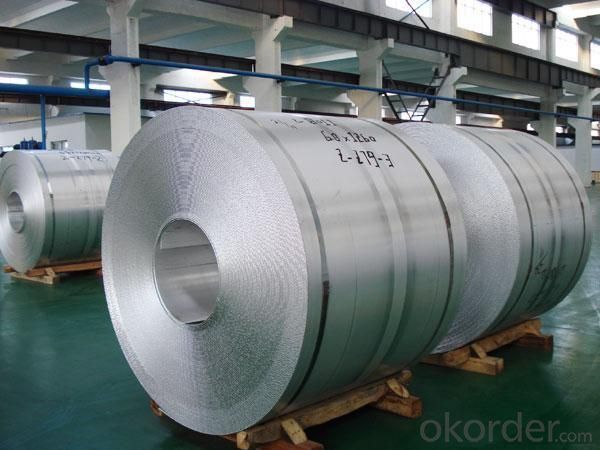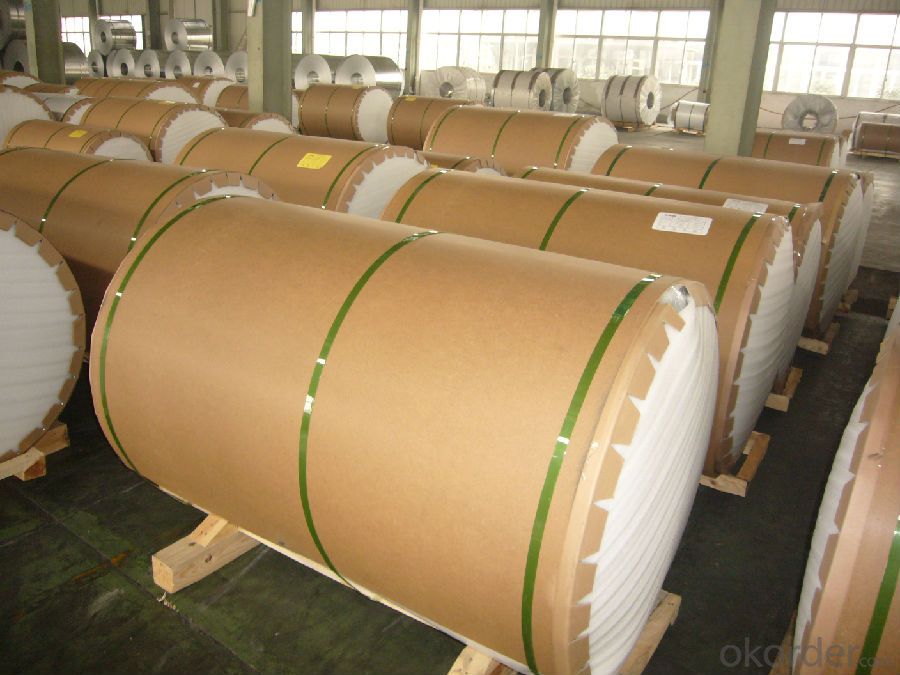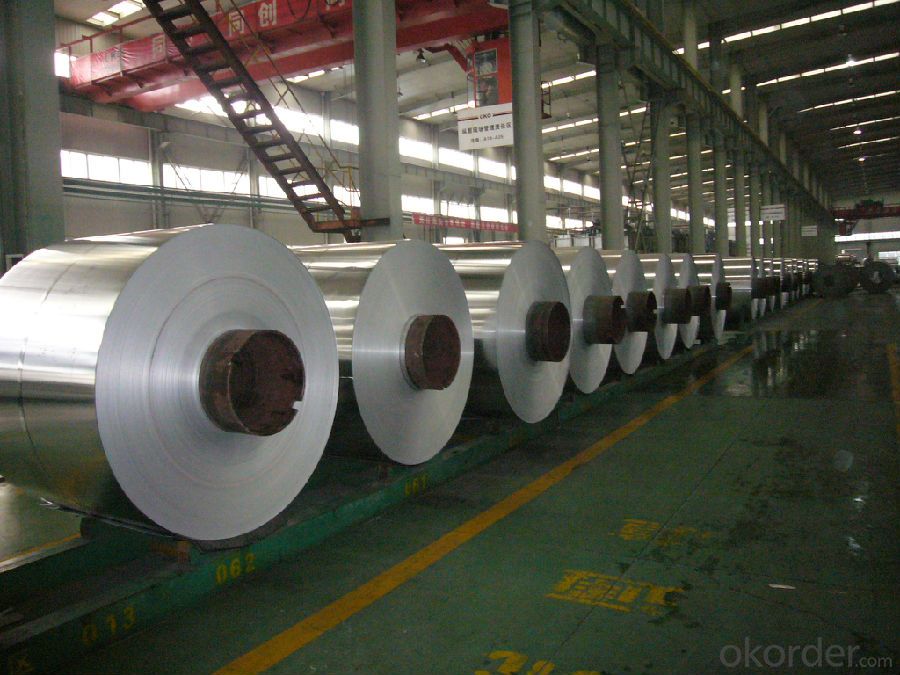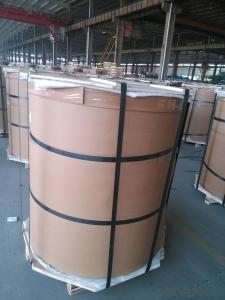C.C AA1100 Aluminum Coils used as BUiding Material
- Loading Port:
- Shanghai
- Payment Terms:
- TT OR LC
- Min Order Qty:
- 3 m.t.
- Supply Capability:
- 10000 m.t./month
OKorder Service Pledge
OKorder Financial Service
You Might Also Like
Item specifice
1.Structure of C.C AA1100 Aluminum Coils used as BUiding Material Description
C.C AA1100 Aluminum Coils used as BUiding Material widly used in decoration field. For the painting, it depends on the using evironment. If you use in the open air, we recommend the PVDF coated aluminium coils. This kind of painting can last 15-20 years. If you use in the room, we recommend PE coated aluminium coils. The price is much more competitive.
Direct Continuous Aluminium Foil Stock in Coil is one semi-finished aluminium material. This strip can be rolled down to aluminium foil.The final thickess can be 5-20 microns. Aluminium foil is soft, ductile and with a silver-white luster which can be widely used in a large scare of fields.
2.Main Features of C.C AA1100 Aluminum Coils used as BUiding Material
a.Competitive price---We have our own mills and can produce mill finished aluminium coils, so we can control the production cost better.
b.Professional after-sale service---We have more than 15 years exportation experience and you need not worry about the exporation problems.
c.Fast delivery time---We can control the delivery time within 35 days.
3.C.C AA1100 Aluminum Coils used as BUiding Material Images



4.C.C AA1100 Aluminum Coils used as BUiding Material Specification
Alloy | AA1100 |
Temper | H14, H16, H18, H22, H24, H26, H32, O/F |
Thickness | 0.2mm -- 100mm |
Width | 30mm -- 1700mm |
Standard | GB/T 3880-2006,EN |
5. FAQ of C.C AA1100 Aluminum Coils used as BUiding Material
A.How to guarantee the quality?
Customers are welcome to our mill to visit and check the products. Besides, we can arrange a third party to test C.C AA1100 Aluminum Coils used as BUiding Material.
B.When will you deliver the products?
C.C AA1100 Aluminum Coils used as BUiding Material will be delivered within 35 days after receiving advanced payment or original L/C.
- Q:Can aluminum coils be used for thermal insulation purposes?
- Thermal insulation purposes cannot be fulfilled by aluminum coils, as it is a metal with high thermal conductivity, facilitating heat transfer. Consequently, instead of preventing it, utilizing aluminum coils as thermal insulation would actually facilitate the transfer of heat. To achieve effective thermal insulation, materials such as fiberglass, foam, or mineral wool, which possess low thermal conductivity, are commonly employed. These materials establish a barrier that restricts heat transfer, thereby maintaining the desired temperature within a given space.
- Q:Why is the hard drive made of aluminum? Why is steel not used, despite being cheaper?
- The actual disks are made from an aluminum substrate. Aluminum is the best choice for minimizing the inertia of the disk pack, which reduces the energy required to spin it. A steel pack would use much more energy. Many other materials, magnets, copper, gold, oxides, diamond like coatings, insulators are inside disk drives
- Q:at what state is aluminum at room temperature?what are aluminums physical properties?what is aluminum obtained from?
- 1. Solid, liquid, or gas... I bet you can guess. 2. There's a mess of them in the right side info box of the wikipedia article:
- Q:Are there any specific maintenance requirements for aluminum coils?
- Yes, there are specific maintenance requirements for aluminum coils. Aluminum coils are commonly used in HVAC systems and require regular cleaning and maintenance to ensure optimal performance and longevity. Some of the maintenance requirements for aluminum coils include: 1. Cleaning: Regular cleaning of aluminum coils is necessary to prevent the buildup of dirt, dust, and other contaminants. This can be done using a soft brush or a vacuum cleaner with a brush attachment. It is important to clean both the fins and the surface of the coils to ensure proper airflow. 2. Inspection: Regular inspection of aluminum coils is essential to identify any signs of damage or corrosion. Look for any bent fins, leaks, or signs of wear and tear. If any issues are detected, they should be addressed immediately to prevent further damage. 3. Coil Protection: Applying a protective coating to aluminum coils can help prevent corrosion and extend their lifespan. There are various coatings available in the market specifically designed for aluminum coils, which can provide an additional layer of protection against environmental factors. 4. Air Filter Maintenance: The air filters in HVAC systems play a crucial role in maintaining the cleanliness of the coils. It is important to regularly clean or replace the air filters to prevent the accumulation of dust and debris on the coils. Clogged filters can restrict airflow and reduce the efficiency of the system. 5. Regular Maintenance Schedule: Creating a regular maintenance schedule is essential to ensure that all necessary maintenance tasks are performed on time. This can include cleaning, inspection, and any other specific requirements recommended by the manufacturer. It is important to consult the manufacturer's guidelines and recommendations for specific maintenance requirements for aluminum coils, as they may vary depending on the type of system and application. Following these maintenance requirements can help ensure that aluminum coils function efficiently and have a longer lifespan.
- Q:What are the thermal conductivity properties of aluminum coils?
- The properties of aluminum coils include excellent thermal conductivity. Aluminum is recognized for its high thermal conductivity, which allows it to efficiently transfer heat. As a result, aluminum coils are well-suited for applications that necessitate effective heat transfer, such as air conditioning and refrigeration systems. The thermal conductivity of aluminum coils enables rapid and efficient cooling or heating, leading to enhanced performance and energy efficiency. Furthermore, aluminum's favorable thermal conductivity guarantees the even distribution of heat across the coil, preventing localized areas of high temperature and ensuring uniform temperature distribution. In conclusion, the thermal conductivity properties of aluminum coils make them a preferred option for a wide range of heat transfer applications.
- Q:Are aluminum coils resistant to UV radiation?
- Yes, aluminum coils are generally resistant to UV radiation. Aluminum is a highly durable and corrosion-resistant material, and it has natural properties that make it resistant to the damaging effects of UV radiation. Unlike certain other metals, aluminum does not oxidize or deteriorate when exposed to sunlight for extended periods of time. This makes it an ideal choice for applications where UV exposure is a concern, such as outdoor structures, solar panels, and automotive components. However, it is important to note that while aluminum is resistant to UV radiation, it can still be subject to other forms of degradation if not properly protected or maintained.
- Q:Why does it take less energy to get aluminum metal from used cans than to get it directly from the ore?
- in order to extract the raw aluminum, you have to heat everything and melt it first, then remove the stuff that precipitates out as it cools or forms via chemical reaction with catalysts you introduce. With aluminum cans, you don't have to raise the temperature much above the melting point of aluminum, since it's already the substance in the can with the highest melting point. With aluminum ore, there can be anything in the ore with pretty much any melting point. In particular, if the ore contains an alloy of aluminum and a metal with a higher melting point than aluminum, then rest assured, you will have to raise the temperature of the ore above the melting point of aluminum in order to melt that alloy, In any case, because the maximum required temperature of the smelter needed to melt used aluminum cans is necessarily lower than the maximum temperature required to work with the ore, less energy is required to get aluminum from used cans than from ore.
- Q:Can aluminum coils be used for pharmaceutical packaging?
- Certainly, pharmaceutical packaging can make use of aluminum coils. Aluminum is widely preferred for such purposes owing to its numerous advantageous properties. Notably, its lightweight nature, resistance to corrosion, and exceptional barrier properties render it exceptionally suitable for safeguarding pharmaceutical items against external elements like moisture, oxygen, and light. Moreover, aluminum coils can be conveniently fashioned into various shapes and sizes, thereby offering flexibility to meet diverse packaging requirements. It is also worth mentioning that aluminum is both non-toxic and non-reactive, thereby guaranteeing the safety and overall quality of pharmaceutical products.
- Q:Can aluminum coils be used in food processing or packaging applications?
- Yes, aluminum coils can be used in food processing or packaging applications. Aluminum is a widely used material in the food industry due to its excellent properties such as corrosion resistance, light weight, and heat conductivity. It is commonly used for wrapping food, creating food containers, and in the form of coils for various food processing applications. Aluminum coils are often used for packaging perishable food items like meat, dairy products, and beverages. The coils can be easily formed into different shapes and sizes to meet specific packaging requirements. Aluminum's excellent barrier properties help protect the food from moisture, oxygen, and light, ensuring longer shelf life and maintaining food quality. In food processing, aluminum coils are utilized in various equipment such as heat exchangers, evaporators, condensers, and refrigeration systems. Aluminum's thermal conductivity allows for efficient heat transfer, making it suitable for applications that require precise temperature control. Furthermore, aluminum is non-toxic and does not react with food, making it a safe and hygienic choice for food processing and packaging. It is also recyclable, making it an environmentally friendly option. Overall, aluminum coils are widely accepted and used in food processing and packaging applications due to their versatility, durability, and suitability for maintaining the quality and safety of food products.
- Q:What is the typical coefficient of thermal expansion for aluminum coils?
- The typical coefficient of thermal expansion for aluminum coils is approximately 23 x 10^-6 per degree Celsius. This means that for every degree Celsius increase in temperature, the length of the aluminum coil will expand by 23 parts per million. The coefficient of thermal expansion is an important factor to consider when designing and working with aluminum coils, as it affects their dimensional stability and can cause thermal stresses in the material when exposed to temperature changes.
1. Manufacturer Overview |
|
|---|---|
| Location | |
| Year Established | |
| Annual Output Value | |
| Main Markets | |
| Company Certifications | |
2. Manufacturer Certificates |
|
|---|---|
| a) Certification Name | |
| Range | |
| Reference | |
| Validity Period | |
3. Manufacturer Capability |
|
|---|---|
| a)Trade Capacity | |
| Nearest Port | |
| Export Percentage | |
| No.of Employees in Trade Department | |
| Language Spoken: | |
| b)Factory Information | |
| Factory Size: | |
| No. of Production Lines | |
| Contract Manufacturing | |
| Product Price Range | |
Send your message to us
C.C AA1100 Aluminum Coils used as BUiding Material
- Loading Port:
- Shanghai
- Payment Terms:
- TT OR LC
- Min Order Qty:
- 3 m.t.
- Supply Capability:
- 10000 m.t./month
OKorder Service Pledge
OKorder Financial Service
Similar products
New products
Hot products
Related keywords





























